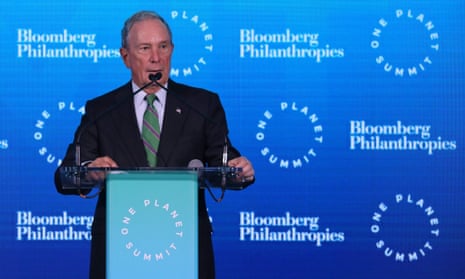After Michael Bloomberg confirmed his run for president on Sunday, the news service that bears his name said it would not “investigate” the billionaire or any of his Democratic rivals.
A former editor of his Bloomberg Businessweek title branded the decision “staggering” and said journalists at Bloomberg News “deserve a hell of a lot better than this”.
The editor-in-chief, John Micklethwait, announced the new rules in a note to 2,700 journalists and analysts.
“There is no point in trying to claim that covering this presidential campaign will be easy for a newsroom that has built up its reputation for independence in part by not writing about ourselves,” Micklethwait wrote.
Bloomberg started his news service in 1990 to complement the financial information he sold to customers. It operates a TV and radio network and the business magazine.
Micklethwait said reporters would still cover polls, policies and how the Bloomberg campaign is faring. But they will not do investigative stories on Bloomberg or any other Democratic contender. It will continue to investigate the Trump administration.
If other credible organizations do investigative stories on Bloomberg or other Democrats, the news service will summarize or publish them in full, Micklethwait said. Bloomberg News “has handled these conflicts before – and proved our independence”, he added.
The announcement prompted criticism from some former Bloomberg journalists. When Bloomberg was considering a candidacy in 2016, politics news director Kathy Kiely resigned, saying she did not feel she could do her job without covering him aggressively.
Kiely said the new rules “relegate his political writers to stenography journalism … it’s not satisfying for journalists and it’s not satisfying for readers. I think people will go elsewhere for in-depth political coverage.”
Kiely said Bloomberg should step completely away, instead of undermining an organization “he worked so hard and spent so much money to build up”.
Megan Murphy, a former editor of Bloomberg Businessweek, tweeted: “It is truly staggering that *any* editor would put their name on a memo that bars an army of unbelievably talented reporters and editors from covering massive, crucial aspects of one of the defining elections of our time. Staggering.”
Reporters and editors at her old title, she added, “are some of the hardest working in the industry. It is not an easy place. They deserve a hell of a lot better treatment than this. But I know they will continue to bust their asses to do great work, because *that’s* journalism.”
Bloomberg Opinion will no longer carry unsigned editorials, since they usually reflect Bloomberg’s point of view. It will continue to run opinions by columnists and some outsiders, though none of the latter will be about the campaign.
David Shipley, who has overseen Bloomberg Opinion as its senior executive editor, will join the campaign, Micklethwait said. Some other members of the editorial board will also take leaves of absence. The chief content officer, Marty Schenker, has been asked to oversee campaign coverage.
“This is a structure that can cope with many eventualities,“ Micklethwait wrote. “No doubt, many of you are already thinking of possible complexities that may raise. My response is: let’s get back to work. We can spend a long time debating ‘what ifs.’ I would rather that we got on with the journalism and let the work speak for itself.”
Bloomberg’s business interests include selling financial data services and employ more than 19,000 people in 69 countries.
Richard Painter, a professor at University of Minnesota Law School who was chief White House lawyer for ethics under George W Bush, said Bloomberg “needs to pledge that if he’s elected president, basically all his companies get sold”.
Painter said that should include changing the governance of Bloomberg’s charitable foundation. Though Bloomberg kept his companies while he served as mayor of New York, Painter added, “the mayor of New York doesn’t regulate the financial industry.”
Every president since Jimmy Carter has acted to sell assets that could create conflicts of interest – except Donald Trump.
Asked about potential conflicts of interest earlier this year, Bloomberg pledged to “separate” from his foundation and private businesses should he run. On Sunday, it was unclear whether he was still committed to doing so.
